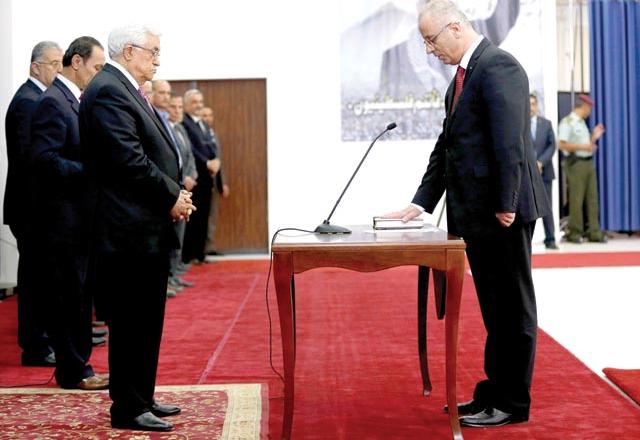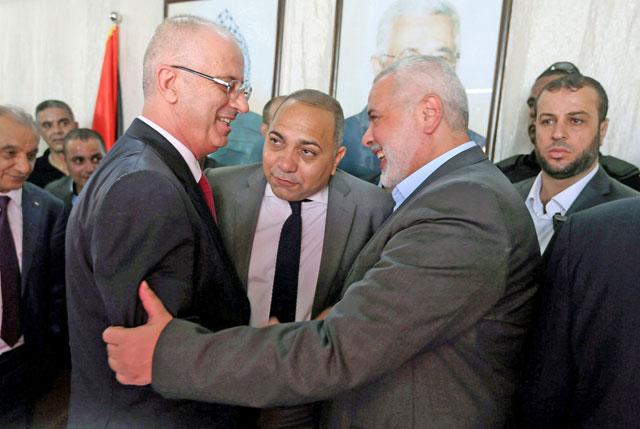You are here
Palestinian Cabinet convenes in Gaza in move to reconcile with Hamas
By Reuters - Oct 04,2017 - Last updated at Oct 04,2017

A Palestinian member of Hamas security forces guards outside the Palestinian prime minister’s headquarters in Gaza City on Tuesday (Reuters photo by Mohammed Salem)
GAZA — Prime Minister Rami Hamdallah chaired the first meeting of the Palestinian Cabinet in the Gaza Strip for three years on Tuesday, in a move towards reconciliation between the mainstream Fateh Party and Islamist group Hamas.
Hamas seized Gaza in 2007 in fighting with Fateh forces loyal to President Mahmoud Abbas and has ruled the impoverished desert enclave of two million people since.
The Cabinet session was the first in Gaza since 2014, Hamdallah told ministers, and a major step in a reconciliation process promoted by neighbouring Egypt and other US-allied Arab countries.
“Today, we stand before an important historical moment as we begin to get over our wounds, put our differences aside and place the higher national interest above all else,” Hamdallah said.
Hamas chief Ismail Haniyeh echoed the optimism, saying: “There might be some difficulties on the road, but we will conclude reconciliation, regardless of the cost.”
Israeli Prime Minister Benjamin Netanyahu warned the Palestinians against engaging in “bogus reconciliations” and he referred to Iranian funding for Hamas, which has fought three wars with Israel since 2008.
In a statement, Netanyahu said any Palestinian administration should “recognise Israel, disband the Hamas military arm, [and] sever the connection with Iran”.
Hamas, considered a terrorist group by Israel and the West, last month disbanded its Gaza shadow government after Egypt, Saudi Arabia and the United Arab Emirates clamped an economic boycott on its main donor, Qatar.
But while Hamas has handed over administrative responsibilities to a unity government originally formed three years ago, its armed wing remains the dominant force in Gaza.
A first sign of discontent surfaced on Tuesday with Hamas criticising Abbas’ decision to await the outcome of talks Fateh plans to hold with the group on October 10 before lifting sanctions he has imposed on Gaza.
“The government has assumed its responsibilities in Gaza and therefore delay is not justified,” Hamas spokesman Fawzi Barhoum said. “There is no excuse for delaying or undermining measures that would ease the suffering of Gaza’s people.”
‘One state, one law, one weapon’
Abbas halted payments for Israeli-supplied electricity to the enclave in June, a step that has led to long daily blackouts, and cut salaries for Gaza civil servants.
Abbas told Egyptian TV station CBC on Monday there could be only “one state, one regime, one law and one weapon” in Gaza, reiterating a long-held position that security should be in the hands of only the Palestinian Authority (PA), which he heads, and that the PA must control border crossing points.
In a pre-recorded address to the Palestinian Cabinet, Egyptian President Abdel Fattah Al Sisi urged unity.
“I assure you we have no time to waste, and that history will hold accountable those who waste the current opportunity to bring about peace,” Sisi said.
Both Israel and Egypt — whose intelligence chief arrived in Gaza to meet Hamas leaders, Hamdallah and officials from other Palestinian factions — maintain a partial blockade of Gaza, citing security concerns.
Israeli-Palestinian talks have been frozen since 2014 over issues such as Fateh-Hamas reconciliation and Israeli settlement-building in occupied territory.
Visiting the Jewish settlement of Maale Adumim in the occupied West Bank on Tuesday, Netanyahu said “thousands of housing units” would be added to the community of 40,000 people near Jerusalem. He gave no timeframe.
Israel has built about 120 settlement units in the West Bank. About 350,000 settlers live there and a further 200,000 in East Jerusalem, among about 2.6 million Palestinians.
Most countries consider the settlements illegal and an obstacle to peace as they take up territory Palestinians need for a viable state. Israel disagrees, citing biblical, historical and political connections to the land and security interests.
Related Articles
President Mahmoud Abbas swore in a Palestinian unity government on Monday in a reconciliation deal with Hamas Islamists that led Israel to freeze US-brokered peace talks.
RAMALLAH — Palestinian leaders have asked Prime Minister Rami Hamdallah for a "temporary" Cabinet reshuffle, officials said Wednesday, as in
CAIRO — Unity talks between rival Palestinian factions Fateh and Islamist group Hamas in Cairo began on an optimistic note on Tuesday, with


















